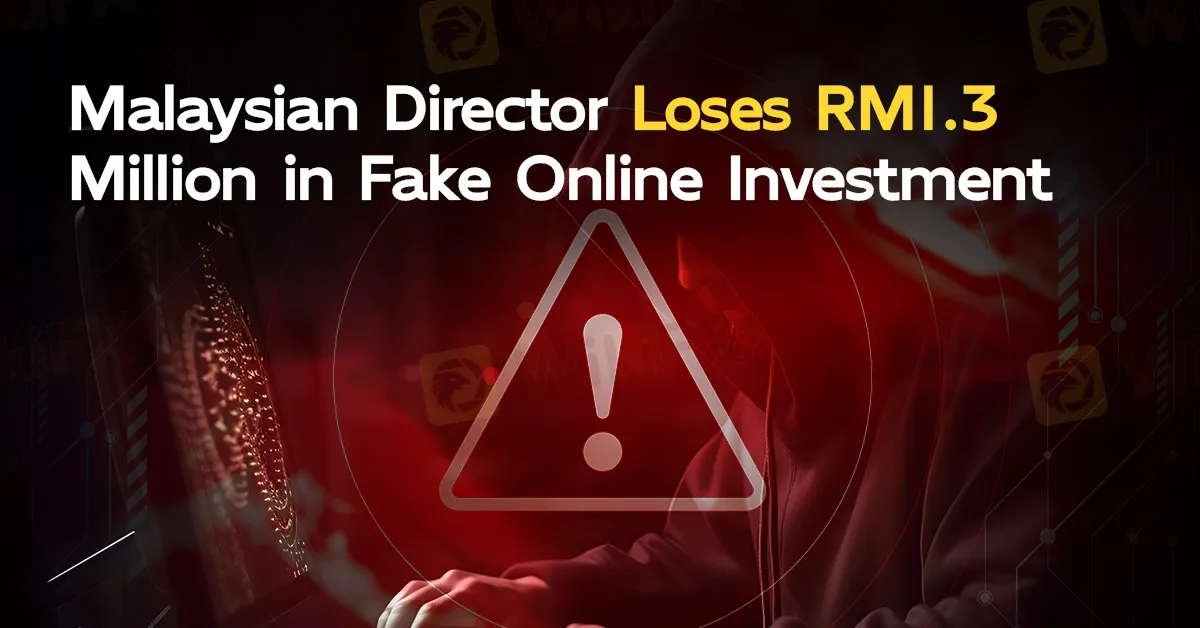简体中文
繁體中文
English
Pусский
日本語
ภาษาไทย
Tiếng Việt
Bahasa Indonesia
Español
हिन्दी
Filippiiniläinen
Français
Deutsch
Português
Türkçe
한국어
العربية
Malaysian Director Loses RM1.3 Million in Fake Online Investment
Abstract:A company director in Malaysia lost more than RM1.3 million (over $275,500) after being ensnared by a fraudulent online investment scheme.

A company director in Malaysia lost more than RM1.3 million (over $275,500) after being ensnared by a fraudulent online investment scheme.
A company director in Malaysia lost more than RM1.3 million after being ensnared by a fraudulent online investment scheme. This incident underscores the increasing prevalence of online scams and the importance of vigilance in digital transactions.
Seremban district police chief, ACP Mohamad Hatta Che Din, revealed that the 45-year-old man had engaged with an unidentified individual via WhatsApp. Over the span of nearly a month, from April 29 to May 28, the victim conducted a series of transactions. Mohamad Hatta stated that the victim executed 16 transactions, utilizing both his personal funds and the company's money for the investment. The victim lodged a report, and the case is now being investigated under Section 420 of the Penal Code.

This type of scam, often referred to as a Ponzi scheme, preys on the trust and greed of individuals, promising high returns with little to no risk. The scammer typically uses convincing communication tactics and false documentation to appear legitimate. In this case, the victim's interactions were entirely through WhatsApp, a common method used by fraudsters to avoid detection and traceability.
Mohamad Hatta also disclosed that the Commercial Crime Investigation Department at the Seremban District Police Headquarters has initiated 55 investigation papers related to losses amounting to RM4.38 million from January to June 11, all connected to similar fraudulent activities. This alarming figure highlights a broader issue within the region, where individuals and businesses alike are being targeted by sophisticated online scams.
Within this timeframe, 23 individuals have been charged under Section 424 of the Penal Code and Section 29(1) of the Minor Offences Act 1955. These charges reflect the authorities' commitment to cracking down on such fraudulent activities and bringing the perpetrators to justice. The investigation process often involves tracing financial transactions, identifying digital footprints, and collaborating with other law enforcement agencies to track down the criminals involved.
The rise in online investment scams can be attributed to the increasing reliance on digital platforms for financial transactions and the allure of quick profits. Scammers exploit these trends, using technology to create convincing but fraudulent schemes. The anonymity provided by the internet further emboldens these criminals, making it challenging for victims to identify and avoid scams.
To prevent such unfortunate incidents, resources like WikiFX can be invaluable. WikiFX is a platform that provides comprehensive information about forex brokers, including their regulatory status and user reviews. By using WikiFX, investors can verify the legitimacy of brokers and avoid fraudulent schemes. The platforms database includes detailed profiles of brokers, enabling users to make informed decisions and protect their investments. Utilizing tools like WikiFX can significantly reduce the risk of falling victim to scams by ensuring that investment opportunities are credible and trustworthy.

Mohamad Hatta emphasized the importance of verifying the legitimacy of any investment opportunity before committing funds. He advised the public not to trust online investment offers easily and to contact the CCID Scam Response Centre at 03-26101559 or 03-26101599 for further information or advice. This proactive approach can help potential victims recognize and avoid scams, thereby reducing the incidence of such fraudulent activities.

Disclaimer:
The views in this article only represent the author's personal views, and do not constitute investment advice on this platform. This platform does not guarantee the accuracy, completeness and timeliness of the information in the article, and will not be liable for any loss caused by the use of or reliance on the information in the article.
Read more

Financial Educator “Spark Liang” Involved in an Investment Scam?!
A 54-year-old foreign woman lost her life savings of RM175,000 to an online investment scam that promised high returns within a short timeframe. The scam was orchestrated through a Facebook page named "Spark Liang."

The Hidden Checklist: Five Unconventional Steps to Vet Your Broker
Forex broker scams continue to evolve, employing new tactics to appear credible and mislead unsuspecting traders. Identifying these fraudulent schemes requires vigilance and strategies beyond the usual advice. Here are five effective methods to help traders assess the legitimacy of a forex broker and avoid potential pitfalls.

Doo Financial Obtains Licenses in BVI and Cayman Islands
Doo Financial, a subsidiary of Singapore-based Doo Group, has expanded its regulatory footprint by securing new offshore licenses from the British Virgin Islands Financial Services Commission (BVI FSC) and the Cayman Islands Monetary Authority (CIMA).

CFI’s New Initiative Aims to Promote Transparency in Trading
A new programme has been launched by CFI to address the growing need for transparency and awareness in online trading. Named “Trading Transparency+: Empowering Awareness and Clarity in Trading,” the initiative seeks to combat misinformation and equip individuals with resources to evaluate whether trading aligns with their financial goals and circumstances.
WikiFX Broker
Latest News
Why is there so much exposure against PrimeX Capital?
Russia to Fully Ban Crypto Mining in 10 Regions Starting January 1, 2025
Two Californians Indicted for $22 Million Crypto and NFT Fraud
WikiFX Review: Is Ultima Markets Legit?
Colorado Duo Accused of $8M Investment Fraud Scheme
What Impact Does Japan’s Positive Output Gap Have on the Yen?
Malaysia Pioneers Zakat Payments with Cryptocurrencies
FCA's Warning to Brokers: Don't Ignore!
Financial Educator “Spark Liang” Involved in an Investment Scam?!
21 Arrested in Telangana Cryptocurrency Scam
Currency Calculator


